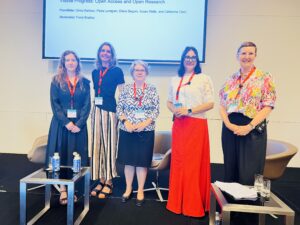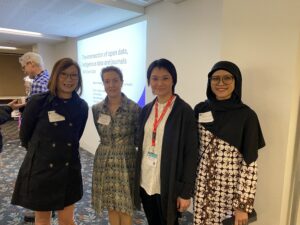Open Access, Open Science & Scholarship at the IFLA Information Futures Summit
10 October 2024
Open Science & Scholarship Advisory Committee (OSS) was actively engaged in the IFLA Information Futures Summit held in Brisbane, Australia 30 September-2 October 2024 through an ignite talk, panel session, and associated one-day event.
Ignite – rights retention
Fiona Bradley, OSS Chair (Australia) and Susan Reilly, OSS member (Ireland) presented an ignite talk on rights retention and secondary publishing right, noting that while legislation and policies differ around a global principle in favour of researcher rights is emerging. Fiona and Susan asserted that researchers and their institutions should regain ownership and control over their work, which can be achieved through copyright reform, institutional and national policies. National policies and reform are being explored in Ireland and Australia, and already exist in several countries in Europe. Libraries are a fundamental part of making rights retention a reality by providing guidance to researchers, and infrastructure including repositories to make research openly available. OSS is forming a working group to progress discussion on this topic within IFLA.
Open Access panel – visible progress

A panel discussion on open access was chaired by Fiona Bradley with panellists representing European, Australian and developing country libraries and the perspectives of researchers. The panel explored how open access to research and other information benefits society and how all libraries including public libraries are essential places to access information and skills. The way researchers advance their careers and are assessed were discussed in the context of the International Science Council’s 8 principles for publishing and DORA. Access to trusted research information amid a climate of misinformation, engaging citizen scientists, cost barriers faced in developing countries, and respect for Indigenous data sovereignty were among many other topics covered during the session. Panellists and the audience were invited to give their pitch to progress open access that included:
- Taking a principles-based approach
- Libraries as an essential infrastructure to access information and skills, including at local level, engaging with communities
- Removing barriers, focusing on equity, and raising awareness
- Support open infrastructure and software
- Improve discovery of open access content
- Position libraries to be seen as centres of confidence
- Support for institutional publishing (for example, many law journals are published within universities, and a growing number of ‘diamond’ journals in other subject areas)
Open data – challenges and opportunities for change one-day event

Following the Summit, OSS and CLM presented a one-day event hosted at the State Library of Queensland. Speakers from Australia, Canada, the US, Hong Kong, Indonesia, the UK, UN Library and IFLA Headquarters contributed to a vibrant day of discussions. Sessions covered a wide range of topics with practical guidance for attendees.
The critical role of libraries in providing services and infrastructure to researchers and students to create, reuse, and preserve data. Persistent identifiers are essential means of linking people and research data. These roles intersect with research integrity and trust, and positive incentives to share data. The way librarians build collections is changing, and we need to be comfortable with discomfort. There are many ways to engage new audiences, from working with students to use research data in Hong Kong, to collaboration with the CNKI platform to support diamond open access in the humanities.
Indigenous data sovereignty and access protocols, and the need to put Indigenous knowledge on the agenda in Europe were discussed. Whenever researchers work with any community, they need to be responsible and ethical. In the Australian context, BADDR data is often more available than data that centres the needs of Aboriginal and Torres Strait Islander people, with efforts seeking to redress the balance now emerging.
Speakers observed that policy approaches across countries vary widely, from somewhat fragmented approaches such as those in the US to the more joined-up Canadian Tri-Council approaches, and national guidelines in Sweden. The situation in developing countries is also different, with many countries learning from experiences from the open government data movement.
Thanos Giannakopoulos and Megs Wacha from the UN Dag Hammarskjöld Library shared the recently adopted UN Pact for the Future, and discussed how information integrity and trustworthiness of information and sources are essential in light of the rise of generative AI, and that misinformation and disinformation needs to be countered both online and offline. They stressed the importance of an environment of critical thinking, and inclusive decision making that leaves no one behind. The SDGs can be an important entry point for ways to engage the public in citizen science. The panel discussion that followed explored that information literacy is turning 50 and that we once largely relied on others to be the custodians of authenticity, but we must now define our own responsibilities. Big tech companies are discussing ways to digitally watermark content sources, but there is debate over why civil society isn’t more involved in these processes, and who these pushes for transparency will benefit. On a range of issues including generative AI, trust libraries need to work in coalition with public interest organisations spanning licensing, open content/open culture, and libraries. Numerous copyright claims continue to be raised in relation to LLM training, but speakers emphasised that copyright is not the answer as there simply is not enough money to make licensing schemes effective.
Stephen Wyber, IFLA’s Director of External Affairs, shared an update on IFLA’s advocacy work and opportunities for OSS and CLM. These include how open research helps to advance research and educational goals, and recent advances in secondary publishing rights signalling a growing movement towards legislative reform. Internet governance has long focused on connectivity, but has recently engaged more with content issues, providing an opportunity to advocate for the role that libraries play in meaningful connectivity and access. Debates about information integrity can be used for good to help define what a healthy information environment can look like. Lastly, the WIPO Toolkit on Preservation provides practical guidance to libraries on their role in the digital age.
OSS will engage with members and units across the federation to implement the outcomes of the Summit, together with the new IFLA strategy and Trend Report, in its upcoming work.